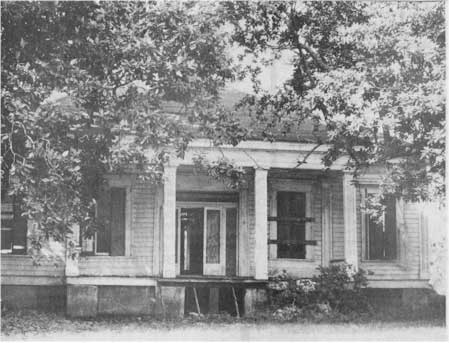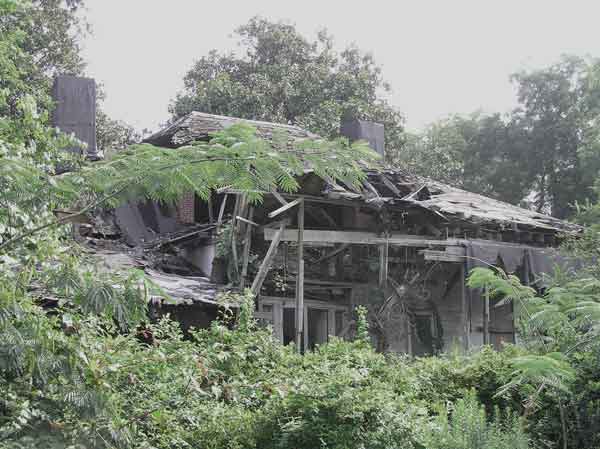Historic Coker
House at Champion Hill
to be Razed
By
Rebecca Blackwell Drake
The Coker House as it
appeared during the 1970s after Cal Main Industries donated
the house and property to the Jackson Civil War Roundtable.
In the year 2000, the ownership of the property was
transferred to the Mississippi Department of Archives and
History. The house was built circa 1852 by H. B. Coker and
was used as a Union hospital during and after the Battle of
Champion Hill.
The Coker House, located
on the Raymond-Edwards road three miles southeast of Edwards, is
known for the role that it played during the Battle of Champion
Hill. The one-story Greek Revival house was built circa 1852 by H.
B. Coker who was a prominent planter in the area. After the Battle
of Champion Hill, Coker and his family abandoned the house and took
refuge in Alabama.
The Coker House was one of five houses to play a prominent role
during the Battle of Champion Hill. Other prominent houses on the
battlefield included: Hiawatha, located on the Raymond-Edwards
road near the crossing at Baker’s Creek; the Isaac Roberts House,
headquarters of General John Pemberton, located a short distance north
of the Coker House; the Cook House, located on the
westward stretch of the Jackson-Vicksburg road; and the Champion
House, located on the Jackson-Vicksburg road within sight of the
Southern Railroad.
Unfortunately, except for the decaying ruins of the Coker House,
none of these houses can be seen on the battlefield today. The
Champion House was burned by the Yankees soon after the Siege of
Vicksburg. The Roberts House was bulldozed years ago, but the old
cistern remains in the weeds. Another old cistern is all that survives
from the original Cook House but the land was recently purchased
by the Civil War Preservation Trust. Hiawatha, the only house
left standing, was moved from the battlefield to the nearby city
of Raymond where it was restored and is now a private residence. A pair
of old Magnolia trees marks the site where the house once stood.
On May 16, 1863, three Confederate divisions (Loring, Stevenson, and
Bowen) commanded by General John Pemberton met General U. S. Grant’s
army in the Midway Station area situated near the Southern Railroad, the
Jackson-Raymond Road, the Raymond-Edwards Road, and Baker’s Creek. The
encounter turned out to be a day-long battle with the tactical advantage
shifting numerous times. By late afternoon, as the Confederates faced
defeat, Pemberton ordered a retreat to the Big Black River near Bovina.
During the retreat, General Lloyd Tilghman, (Loring’s Division) was
killed as he defended the escape route across Baker’s Creek. His body
was carried from the battlefield to nearby Hiawatha. During and
after the battle, the Coker House was used as a Union hospital
while Hiawatha served as a Confederate hospital.
A rear view of the ruins of the Coker House as seen
today.
Around mid-century, the Coker House was bought by Cal Main
Industries which later donated it to the Jackson Civil War Round Table.
Mississippians and Civil War historians were hopeful that the house,
one of Mississippi’s Civil War treasures, would be restored. In the
year 2000, the house changed hands once again when the Jackson Civil War
Round Table made the decision to donate the house and property to the
Mississippi Department of Archives and History. By this time, however,
the house was in desperate need of repair and nature had begun to take
its toll. By the year 2003, the cost of trying to save the historic
structure had soared to almost two million dollars.
Recently, in the December 2007 issue of the national newspaper Civil
War News, a feature article by Deborah Fitts entitled, “Coker
House to Come Down at Champion Hill Battlefield” stated the news
that all Mississippians and Civil War historians hated to hear: “The
Coker House, the last remaining structure to witness the battle of
Champion Hill, was expected to be ‘deconstructed’ in November and placed
in storage.” Sources say that a replica will be built in its place
but this is yet to be determined.
Mississippians and those passionate about Civil War history will bemoan
the loss of the Coker House but will wait to see what plans are
in the making to replace the structure. It is our dream that the
Champion Hill battlefield will be developed in a way that will attract
tourists to Mississippi while at the same time preserving the pristine
qualities of one of the most famous battlefields in the South. With the
combined efforts of the Mississippi Department of Archives & History,
the Civil War Preservation Trust, and the Vicksburg National Military
Park this dream is sure to happen.


| Home | Grant's March | Pemberton's March | Battle of Champion Hill | Order of Battle | Diaries & Accounts | Official Records |
| History | Re-enactments | Book Store | Battlefield Tour | Visitors |
Copyright (c) James and Rebecca Drake, 2007. All Rights Reserved.